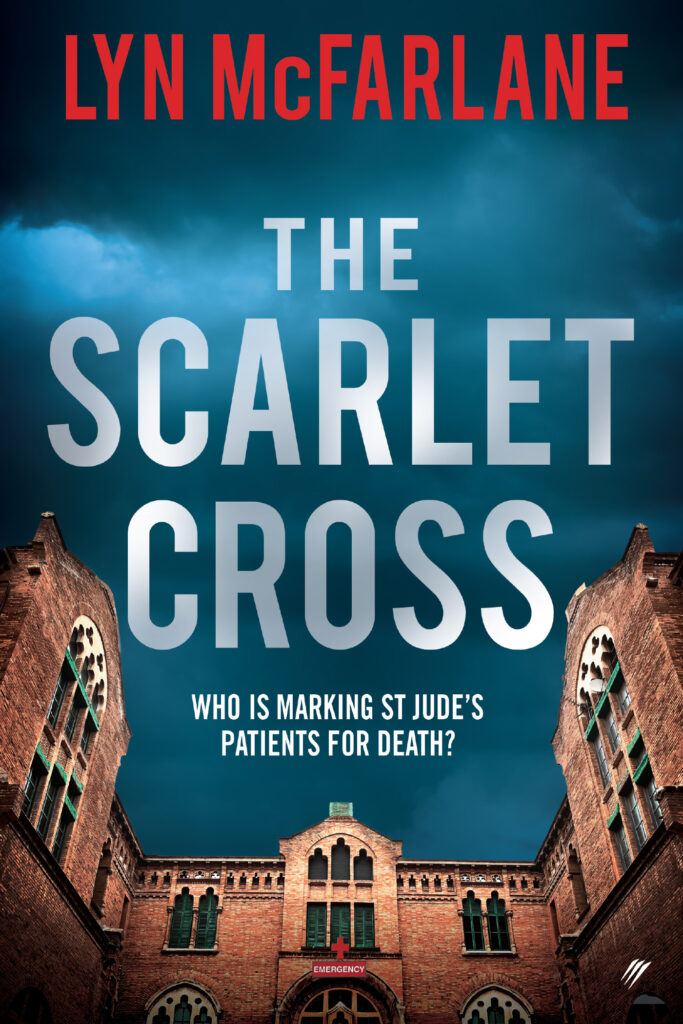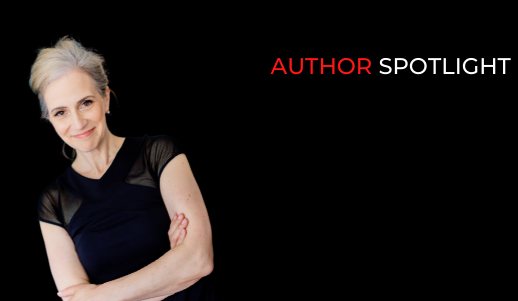Nurses are not often at the centre of crime and mystery novels. Author Lyn McFarlane, who splits her time between Sydney and Vancouver Island, talked to Maggie Baron about the challenges she had writing her debut novel, The Scarlet Cross (Pantera Press).
Hello Lyn. Firstly, congratulations on The Scarlet Cross and on winning the 2019 Arthur Ellis “Unhanged” award for best unpublished manuscript, sponsored by the Crime Writers of Canada and Toronto’s Dundurn Press.
I’m here to shine a light on your novel which drops us into a busy hospital emergency ward where we meet nurse Meredith Griffin. She’s a specialist psychiatric nurse with a complex family history and first-hand experience of the challenges of mental health and the toll it can take on individuals, their families, and loved ones. Most readers will have some experience of the hospital environment. What struck me about your book was the skill you showed taking people beyond the surgical gowns and scrubs, into the very heart and soul of emergency care and those facing the front line daily.
How did you gain your insights about a hospital setting to tell this story?
The original inspiration for The Scarlet Cross came from my sister, who is an avid crime reader and a former psychiatric nurse. She was the one who suggested a hospital as the setting for a crime novel and I heartily agreed: the caregivers in a hospital are often at the coal face of crime, especially in the emergency department. I always knew the amateur sleuth protagonist for The Scarlet Cross was going to be a caregiver – and I didn’t want to revert to the traditional caregiving role of a mother. So, creating Meredith Griffin, the emergency nurse and, caring older sister, chimed very soundly with the story I wanted to tell!
I have many medical professionals in my family – nurses, doctors, clinical professionals, and social workers. My research started with them and branched out to their networks of colleagues. My friend circle also comprises lawyers and psychologists, many of whom work in hospital settings, so that also aided the research. I am so grateful for the many professionals who gave me their time and told me their personal stories of ‘life on the ward’.
Teaming Meredith up with her new boyfriend, homicide detective, Leo Donnelly, meant that she could get police support to solve the mystery. Police have to work with many professionals to solve crimes, and police are often in hospitals doing just that – working with the medical and pathology professionals to find clues and patterns that lead them to the perpetrator. So, the Meredith and Leo team came very naturally, once I started the writing.
You have a number of plots running along simultaneously with a cast of characters ranging from other medical specialists, hospital administrators, the church, police, and legal practitioners as well as Meredith’s extended family. It makes for a heady swirl of action and viewpoints. How did you approach the structure of the story-telling to ensure the reader doesn’t get lost or distracted?
Structure is often my biggest challenge as a storyteller, so it’s a great question! For me, point of view and the timeline of the story are the biggest questions to answer, and these important elements of craft often dictate the structure of my stories. As you’ve described, I wanted to weave several plot lines through The Scarlet Cross. To counter potential complexity, I decided to keep both point of view and the treatment of time simple: except for two discrete, short sections, the entire book is written from Meredith’s point of view and is organised into the months leading up to, the days before, and the days after the book’s climax.
The two sections where I deviate from Meredith’s point of view, are very clearly separated and are given unique Latin names. Moving into another character’s point of view in these sections (and moving to a slightly different time period) allowed me to reveal deeper themes about the hospital’s history, and the corrupt relationship between the hospital and the police.

In addition to the storyline about mental health and human frailty, you also explore the topic of drug addiction with high-functioning professionals. What was it that you wanted to share here? What was so important in exposing a key character in this way?
I’ve been curious about addiction – its neurochemistry and ubiquity – for some time. As a society, we tend to stigmatise addictions, and I think that seriously detracts from our understanding of addiction: the causes of it, the neurochemistry that sustains it, the wounds that often lie beneath it, and the healing required to manage it.
Meredith has a very difficult backstory – she was raised by parents in a loveless marriage, lost both of them quite tragically, and is the sole caregiver to a younger sister with a serious medical condition. She also has a mental health condition that is challenging – mild obsessive-compulsive disorder. She takes drugs to help her manage life, but she soon realises that her addiction makes her vulnerable to the people who want to see her fail. This compels her to make a conscious effort to tackle her addiction, with the help of family friends, and a supportive partner.
My main aim in telling this story of addiction is to emphasise how much we need each other. At some point in our life, no matter how ‘together’ we look on the outside, we will all need the kind of support and compassion that Meredith gets to combat life’s challenges – addiction or otherwise.
Can you tell your readers what you’re currently working on?
I am working on a second novel that features some of the characters in The Scarlet Cross who get pulled into a high-stakes game of trafficking and corruption. They find themselves in grave danger, which challenges their relationships in heartbreaking, but ultimately uplifting, ways.
For more info about Lyn McFarlane, go here.
